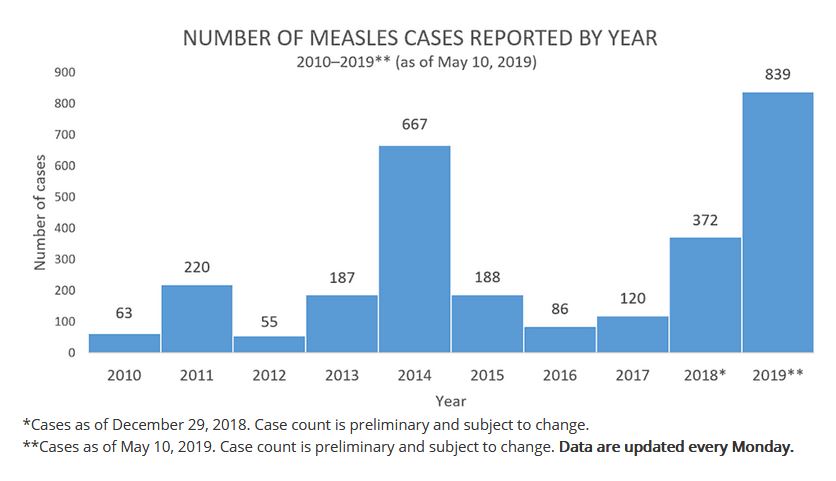The Centers for Disease Control and Prevention are presently tracking the greatest number of reported cases of measles in the U.S. since 1994 and since measles was declared eliminated in 2000. From January 1 to May 10, 2019, 839** individual cases of measles have been confirmed in 23 states. Indiana is one of the states where measles have been reported.
 How Did This Outbreak Happen?
How Did This Outbreak Happen?
Measles is still a common disease in some parts of the world and travelers either bring measles into the U.S. or someone from this country gets measles while traveling and brings it home. The disease can spread in a community where a large number of people have not been vaccinated, which the CDC reports is what has occurred.
All 50 states and the District of Columbia require vaccinations for children entering kindergarten, however all states also provide medical exemptions to these requirements and some states also offer exemptions for religious and philosophical reasons.
Top 4 Things to Know About Measles
The CDC has put together a list of the most important facts about measles that all parents should know as reported on the Centers for Disease Control and Prevention website.
Measles Can Be Serious
Some people think of measles as just a little rash and fever that clears up in a few days, but measles can cause serious health complications, especially in children younger than 5 years of age. There is no way to tell in advance the severity of the symptoms your child will experience.
- About 1 in 4 people in the U.S. who get measles will be hospitalized
- As many as one out of every 20 children with measles gets pneumonia, the most common cause of death from measles in young children.
- 1 out of every 1,000 people with measles will develop brain swelling, which could lead to brain damage
- 1 or 2 out of 1,000 people with measles will die, even with the best care
Some of the more common measles symptoms include fever, rash, runny nose and red eyes.
Measles is Very Contagious
Measles spreads through the air when an infected person coughs or sneezes. It is so contagious that if one person has it, 9 out of 10 people around him or her will also become infected if they are not protected.
Your child can get measles just by being in a room where a person with measles has been, even up to two hours after that person has left. An infected person can spread measles to others even before knowing he/she has the disease—from four days before developing the measles rash through four days afterward.
Your Child Can Still Get Measles in the U.S.
Measles was declared eliminated from the U.S. in 2000 thanks to a highly effective vaccination program. Eliminated means that the disease is no longer constantly present in this country. However, measles is still common in many parts of the world, including some countries in Europe, Asia, the Pacific and Africa. Worldwide, 19 cases of measles per 1 million persons are reported each year and 89,780 people, mostly children, die from the disease.
Even if your family does not travel internationally, you could come into contact with measles anywhere in your community. Every year, measles is brought into the United States by unvaccinated travelers (Americans or foreign visitors) who get measles while they are in other countries. Anyone who is not protected against measles is at risk.
You Can Protect Your Child with a Safe and Effective Vaccine
The best protection against measles is measles-mumps-rubella (MMR) vaccine. MMR vaccine provides long-lasting protection against all strains of measles. Your child needs two doses of MMR vaccine for best protection:
- The first dose at 12 through 15 months of age
- The second dose 4 through 6 years of age
If your family is traveling overseas, the vaccine recommendations are a little different:
- If your baby is 6 through 11 months old, he or she should receive 1 dose of MMR vaccine before leaving.
- If your child is 12 months of age or older, he or she will need 2 doses of MMR vaccine (separated by at least 28 days) before departure.
The Potential for Serious Side Effects is Very Small
According to the CDC, all vaccines carry a risk of a life-threatening allergic reaction (anaphylaxis) in about one per million children. Other serious side effects for the MMR vaccine may include long-term seizures, coma, lowered consciousness, and permanent brain damage, although the CDC notes the rarity of these reactions make it difficult to determine causation.
Deciding not to vaccinate your child against measles puts them and other unvaccinated children (and adults) at risk of catching a disease with higher chances of serious side effects than those associated with the vaccine. Combination vaccines, like MMR (measles, mumps, and rubella), have been used without adverse effects since the mid-1940s.[60]
Additional Resources
We encourage you to learn all you can about the importance of the MMR vaccine. Visit the Centers for Disease and Prevention website for additional information.


